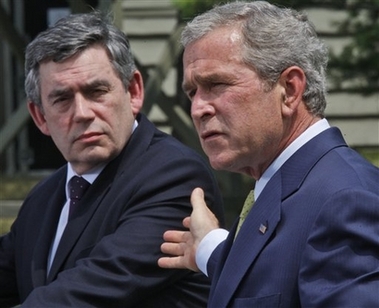Brown, Bush reaffirm shared values
(AP)Updated: 2007-07-31 01:46 CAMP DAVID, Md. - British Prime Minister Gordon Brown told President Bush Monday he shares the US view that there are "duties to discharge and responsibilities to keep" in Iraq.
"Our aim, like the United States is, step-by-step, to move control to the Iraqi authorities," Brown said, joining Bush at a news conference at this mountaintop presidential retreat.
Brown hinted that a decision about British troop levels was coming soon, while assuring that such a determination would be based "on the military advice of our commanders on the ground," thus echoing language often heard from Bush.
 President Bush, right, and British Prime Minister Gordon Brown participate in a joint press availability at Camp David, Md., Monday, July 30, 2007. [AP]  |
Indeed, minutes later, in response to a question, Bush said: "The decisions on the way forward in Iraq must be made with a military recommendation as an integral part of it."
The United Kingdom's commitment to the war is essential to the Bush administration. Britain has 5,500 troops there, with forces moving from a combat role to aiding local Iraqi forces.
Bush didn't directly answer whether he planned to pass on the war to the next president, who will take office in January 2009. But he suggested that was likely. "This is going to take a long time in Iraq, just like the ideological struggle is going to take a long time," he said.
The Camp David meeting was an attempt by Brown and Bush to seek common footing between leaders new to each other, but who jointly oversee one of the world's most important alliances.
In deference to the US-British relationship, Bush gave Brown the full foreign-leader treatment: a coveted overnight stay at the presidential retreat here, three meals of all-American fare and introductory talks spanning a range of weighty matters.
But building personal rapport was the main theme. The men have been together before, but this was their first official sit-down since Brown took office in Britain a month ago. There was some sign they achieved a connection, with Brown thanking Bush for his compassionate words about the death of a baby daughter four years ago and the two trading jokes about Brown's reputation as a dour Scotsman.
Still, what the men stressed was what their nations have in common when they appeared together ¡ª 25 minutes late, a rarity for the usually punctual president -- to cap their talks.
"So everyone's wondering whether or not the prime minister and I were able to find common ground, to get along, to have a meaningful discussion," Bush said at the outset. "And the answer is 'Absolutely.'"
Bush said they met alone over dinner Sunday night for more than two hours, dismissing aides from both countries to the rustic camp's bowling alley (where the British side apparently prevailed).
"You know, he probably wasn't sure what to expect from me," the president said. "I kinda had a sense of the kind of person I was going to be dealing with. I would describe Gordon Brown as a principled man who really wants to get something done."
On the battle against terror, in particular, the men said there is no daylight between their views.
"We know we are in a common struggle and we know we have to work together, and we know we've got to use all means to deal with it," Brown said. "We are at one in fighting the battle against terrorism."
Bush congratulated the prime minister on his response when his country was hit with terror threats and catastrophic flooding immediately after he took office. "You've proved your worthiness as a leader."
"He gets it," the president said of his new partner.
Some of Brown's advisers have caused a stir with comments about Bush's famously close ties with Brown's predecessor, Tony Blair, and the Iraq war -- raising questions about whether British troops were headed for an early withdrawal from Iraq.
"In Iraq we have duties to discharge and responsibilities to keep in support of the democratically elected government and in support of the explicit will of the international community," Brown said.
Military officials have said that British forces are likely to hand over control of Basra, the last area for which they hold responsibility, by the end of the year. Brown said at Bush's side that a decision on the future role of British troops could be announced to Parliament when it returns from a summer recess in October.
That decision would follow the scheduled September report to Bush by Army Gen. David Petraeus.
If Bush had any dissatisfaction about what he heard from Brown on Iraq, he didn't reveal it.
"There's no doubt in my mind he understands the stake of the struggle," Bush said.
Notably, though, Brown is covering his bases. After leaving Bush, he planned to meet US congressional leaders on Capitol Hill, where support for Bush on the war is fading.
He also was heading from Washington for New York, where he will hold talks with UN Secretary General Ban Ki-moon and deliver a speech to the United Nations.
Brown arrived Sunday at Camp David, recalling the first meeting between Bush and Blair at the same place in 2001 when they hardly knew each other, either.
The alliance of the United States and Britain has long been shaped by personalities -- Roosevelt and Churchill, Reagan and Thatcher, Bush and Blair.
Bush likes to size up a fellow world leader in person and measure the person's mettle under fire. Yet time is short and his popularity and clout have worn away with the war in Iraq.
|
|
|
||
|
||
|
|